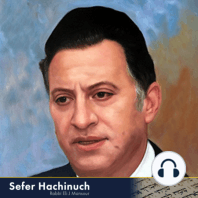20 min listen
Misva #380: Pesach Sheni
FromSefer Hachinuch
ratings:
Length:
20 minutes
Released:
Jan 27, 2023
Format:
Podcast episode
Description
The Torah in Parashat Behaalotecha (Bamidbar 9:11) states that a person who did not, for whatever reason, bring the Korban Pesach at its proper time – the 14 th of Nissan – is required to bring the sacrifice one month later, on the 14 th of Iyar. One brings the sacrifice on the 14 th of Iyar regardless of whether he failed to offer it in Nissan due to circumstances beyond his control, or intentionally. This “makeup” sacrifice, called “Pesach Sheni,” is a unique phenomenon, one which we do not find in regard to other Misvot. Normally, if a person fails to fulfill a Misva before its deadline, then he has squandered the opportunity. When it comes to the Pesach sacrifice, however, the Torah introduces an extraordinary provision allowing – and requiring – him to make up the missed Misva at a later time. The Sefer Ha’hinuch explains that the Torah required making up the missed sacrifice due to the particular importance of the goal of the Korban Pesach. This sacrifice, of course, commemorates the miracles of the Exodus, which reinforce the belief in G-d as the creator of the universe. When people witnessed or heard about the great miracles of Yesi’at Misrayim, and the splitting of the sea, they arrived at the belief that there must be a G-d who created the universe “Yesh Ma’ayin” – bringing matter into existence out of nothingness – as only a Being who created the universe could overturn the laws of nature and perform miracles. Moreover, G-d also brought Beneh Yisrael into the uninhabitable wilderness and miraculously sustained them for forty years – further proving that He created the universe. This belief, the Sefer Ha’hinuch writes, constitutes the central pillar of our faith, and one who denies it has no share in our Torah and no portion in the world to come. Due to the centrality of this belief, G-d established that those who failed to bring the Korban Pesach in the proper time should do so one month later – because this Misva, which serves to reinforce our belief in creation, is too important to squander. The Torah went so far as to require a convert who converted to Judaism in between Pesach Rishon (the first Pesach, in Nissan) and Pesach Sheni, and a boy who became a Bar-Misva during this period, to bring the sacrifice on Pesach Sheni. Even though they were not obligated to bring the sacrifice on Pesach Rishon, nevertheless, this sacrifice is so important, serving to reinforce our belief that all matter was created from nothingness, that they must bring the sacrifice on Pesach Sheni. Several differences exist between the observances of Pesach Rishon and Pesach Sheni. Firstly, on Pesach Rishon, it is forbidden to eat or own Hametz, whereas on Pesach Sheni, there is no prohibition of Hametz. Pesach Rishon is observed for seven days, while Pesach Sheni is observed for just one day. The first and seventh days of Pesach Rishon are observed as a Yom Tob, when Melacha is forbidden; Melacha is entirely permissible on Pesach Sheni. When the sacrifice is offered on Pesach Rishon, Hallel is recited twice – when the animal is slaughtered, and then again at the Seder, when the sacrificial meat is eaten. On Pesach Sheni, Hallel is recited only when the sacrifice is slaughtered. Both Pesach Rishon and Pesach Sheni override the Shabbat restrictions. This means that the Korban Pesach is offered on the 14 th of Nissan even when it falls on Shabbat, and those who must bring Pesach Sheni on the 14 th of Iyar do so even if this day falls on Shabbat. Both Pesach Rishon and Pesach Sheni are subject to the prohibition against leaving over the meat of the sacrifice, and to the prohibition against breaking any of the sacrifice’s bones. One of the examples of a person who brings Pesach Sheni is somebody who was Tameh (ritually impure) on the 14 th of Nissan, and was thus disqualified from participating in the Korban Pesach. This applies if the individual was Tameh as a result of a bodily emission, childbirth, or contact with a human corpse, which gener
Released:
Jan 27, 2023
Format:
Podcast episode
Titles in the series (100)
Misva #1: Periya Ve’riba – Procreation: Daily Sefer Hachinuch - Brought to you by itorah.com by Sefer Hachinuch
